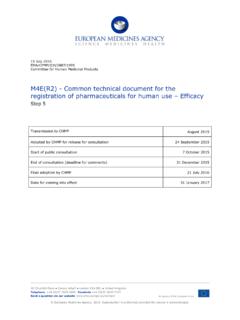Transcription of Measuring Regulatory Performance - OECD
1 Measuring Regulatory PerformanceEVALUATING THE IMPACT OF REGULATION AND Regulatory POLICYBy Cary CoglianeseExpert Paper No. 1, August 2012 ORGANISATION FOR ECONOMIC CO-OPERATION AND DEVELOPMENTThe OECD is a unique forum where governments work together to address the economic, social and environmental challenges of globalisation. The OECD is also at the forefront of efforts to understand and to help governments respond to new developments and concerns, such as corporate governance, the information economy and the challenges of an ageing population.
2 The Organisation provides a setting where governments can compare policy experiences, seek answers to common problems, identify good practice and work to co-ordinate domestic and international OECD member countries are: Australia, Austria, Belgium, Canada, Chile, the Czech Republic, Denmark, Estonia, Finland, France, Germany, Greece, Hungary, Iceland, Ireland, Israel, Italy, Japan, Korea, Luxembourg, Mexico, the Netherlands, New Zealand, Norway, Poland, Portugal, the Slovak Republic, Slovenia, Spain, Sweden, Switzerland, Turkey, the United Kingdom and the United States.
3 The European Union takes part in the work of the work is published on the responsibility of the Secretary-General of the OECD. The opinions expressed and arguments employed herein do not necessarily reflect the official views of the Organisation or of the governments of its member countries. OECD (2012). All rights reserved. 3 EVALUATING THE IMPACT OF REGULATION AND Regulatory POLICY This paper develops a framework for systematically evaluating the Performance of regulations and Regulatory policies.
4 Offering an accessible account of the fundamentals of evaluation, the paper explains the need for indicators to measure relevant outcomes of concern and research designs to support inferences about the extent to which a regulation or Regulatory policy under evaluation has actually caused any change in the measured outcomes. Indicators depend on the specific problems of concern to policymakers as well as on data availability, but the best indicators will generally be those that measure the ultimate problem the regulation or policy was intended to solve.
5 In addition, research designs should seek to emulate the structure of laboratory experiments in order to permit valid causal inferences about the impacts of a regulation or policy under review. The paper discusses strategies for controlling confounders and attributing broad economic effects to regulation. 4 OECD (2012). All rights reserved. FOREWORD OECD countries require better information about where investments in programs to improve regulations should be focused to pay growth and welfare dividends.
6 This is necessary to target scarce resources for reform efforts, and also to communicate progress and generate the political support needed for implementing Regulatory policy reforms. The OECD work on Measuring Regulatory Performance is intended to assist countries with the task of indentifying this information through the development of measurement frameworks and the collection and interpretation of salient data ( ). The OECD is developing a framework for Regulatory Policy Evaluation to help countries evaluate the design and implementation of their Regulatory policy against the achievement of strategic Regulatory objectives (OECD, forthcoming).
7 Its development has been informed by a series of three expert papers. This first paper discusses the complexity of attributing changes in economic or welfare outcomes to changes in regulation and Regulatory policy. It shows the categories of measures for evaluating Regulatory policies and reports a number of indicators that can be used to measure outcomes, which can inform the practical application of an evaluative framework. It has been prepared by Cary Coglianese, Edward B.
8 Shils Professor of Law, Professor of Political Science, and Director of the Penn Program on Regulation at the University of Pennsylvania Law School. A second paper was commissioned from Professor Claudio Radaelli, Director of the Centre for European Governance at the University of Exeter and Oliver Fritsch, Associate Research Fellow at the University of Exeter, to examine country practices for Measuring the Performance of Regulatory policy, and develop options for a set of indicators that OECD countries can use for their Regulatory policy evaluation.
9 A third expert paper by Professor David Parker, member of the UK Regulatory policy committee and emeritus professor at Cranfield University and Professor Colin Kirkpatrick from the University of Manchester, surveys the literature on existing attempts at Measuring the contribution of Regulatory policy to improved Performance (access the experts papers on ). The author of this paper is grateful for helpful conversations with David Abrams, Christiane Arndt, Gregory Bounds, John Coglianese, and Jon Klick, as well as for thoughtful comments on an early draft from Chris Carrigan, Stuart Shapiro and several representatives from OECD member countries.
10 Any remaining errors remain the author s sole responsibility. The project of developing a framework for Regulatory Policy Evaluation has also been directly supported by the Government of Canada, which in 2011 provided a financial contribution to the project, and by the Government of Spain, which hosted an expert workshop on Measuring Regulatory Performance in Madrid on 26-27 September 2011. Overall the work has benefitted from the active engagement of the steering group on Measuring Regulatory Performance , which has had an advisory role in the project.
















